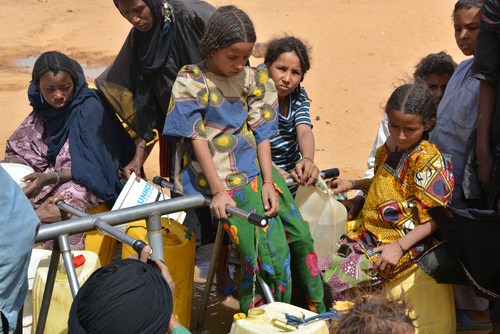UNHCR Niger
Month
Accompagnée depuis plusieurs mois par l’ONG Search For Common Ground grâce au soutien financier de BPRM (Gouvernement des Etats Unis), la troupe de théâtre participatif des jeunes leaders réfugiés maliens de Niamey prend aujourd’hui une nouvelle dimension. En recevant un appui en matériel (instruments de musique, générateur, sono, matériels de délimitation de l’espace scénique) cette troupe de jeunes acteurs dynamiques s’émancipe progressivement pour pouvoir se produire de manière autonome et se rapprocher encore plus de leur communauté. Cette dotation est avant tout le fruit du sérieux et de l’engouement de ces jeunes réfugiés cherchant à être à la fois acteur sur scène et acteur dans la vie de leur communauté en utilisant le théâtre pour questionner et transformer, à travers le rire, les situations à risque et les conflits.

The conflict in Mali which erupted in January 2012 led to the creation of three traditional refugee camps (Abala Mangaize, Tabareybarey) and two so-called “refugee hosting areas” (Zone d’Accueil des Réfugiés, ZAR, in French). The hosting areas are located in Tahoua region with Intikan in Tillia Department which covers an area of approximately 276 ha and a density of 25 persons/ha being UNHCR’s flagship operation in Niger. Intikane has the distinction of not being a camp, but a Hosting Area, which is an experimental concept, in order to adapt to the sociocultural and economic specificities of nomadic refugees. In Intikane unlike in a camp, people live dispersed and have the choice to move wherever they want within the perimeters covered by the area. UNHCR issued a report ( http://data.unhcr.org/SahelSituation/download.php?id=901 ) recently on the living conditions of more than13,000 nomadic refugees living with their livestock (cows, sheep, goats, horses, camels, sheep and donkeys) in the area. In all its missions, the UNHCR implements standards of humanitarian assistance in various areas of intervention (water and sanitation, health, nutrition, shelter / NFI, education) to protect and assist people concerned by its mandate. In the case of ZAR, it became evident that due to the nomadic and agro-pastoral specificity of the Tuareg people, the implementation of Sphere standards poses challenges which leads to this question: Are the Sphere standards applicable in the hosting area of Intikane? And if so, what provisions can further improve and assess the progress of assistance provided in the best compliance to nomadic lifestyle? Download the report here. “http://data.unhcr.org/SahelSituation/download.php?id=901”

No doubt, the message two years old Fana and her parents, all refugees from Nigeria, received in a health center in Diffa region on May 25, 2014 was devastating: The girl had tested positive for the type 2 vaccine-derived Poliovirus – or “wild polio” virus. The so-called “wild polio” virus has remained endemic in northern Nigeria. This is because of low coverage achieved in the routine immunization programmes. Most of the displaced fleeing into the Diffa region are from the troubled state of Borno in northern Nigeria. Immediately a medical team comprising of WHO, UNICEF and Niger’s Ministry of Public Health, was set up. The team worked closely with Damassak health district (in Borno state in Nigeria to where Fana’s family had returned to) and the child was promptly treated. The team, according to Dr. Obama Nse Ricardo of WHO Niger, continues working and has instituted several preventive and emergency measures to check the situation: This includes reinforcing methods for detecting cases of polio, but foremost a mass vaccination campaign to take place from 22nd to 25th August 2014 and a second round from the 5th to 8th September 2014 in all districts of the Diffa region. The influx from Nigeria, or the back and forth movement between Niger and Nigeria as in the case of Fana, amplifies the public health risks in the region which are exacerbated by conflict in northern Nigeria. The polio alert is unlikely to be over soon.

Le choix du 19 août comme Journée mondiale de l’aide humanitaire n’est pas fortuit. Le 19 août 2003, un attentat à la bombe était perpétré contre le Bureau des Nations Unies en Iraq faisant 22 morts. Avant et après cette date, de nombreux travailleurs humanitaires ont perdu la vie. Pour la seule année 2013, 155 (un triste record) ont été tués. Au-delà de l’hommage, pour l’édition 2014 cette journée était tournée vers les héros ordinaires, c’est-à-dire ces personnes qui dans leur quotidien, et en dehors de toute structure humanitaire, font preuve d’empathie et de solidarité pour accompagner les populations dans le besoin. Dans cette optique, nos regards se tournent tout particulièrement vers ces milliers de familles de Diffa qui accueillent les personnes ayant fui le Nigeria mais aussi vers tous ces héros anonymes qui aident l’UNHCR et le gouvernement du Niger à alléger les souffrances des réfugiés. Pour la célébration de cette journée au Niger, les acteurs humanitaires se sont réunis et ont présenté leurs actions dans des centres d’activités socio-éducatives et culturelles de la ville de Niamey, au cœur de la vie de quartiers. La Journée mondiale de l’aide humanitaire est aussi un moment important pour permettre au plus grand nombre de mieux connaitre le travail des humanitaires.
Refugee households in Abala that had previously struggled to secure firewood, can now look forward to four months of gas under a UNHCR project.
The fate of more than 200 Nigerian female students abducted in Nigeria since April moves the world. Among the estimated 50,000 forcibly displaced persons from Nigeria that have entered Diffa region since last year, there are several hundred students that had to interrupt their studies in Nigeria because of the prevailing insecurity in that country. They are now here in Niger unable to continue their studies in the French language and a curriculum that is alien to them. Hence, UNHCR and the Niger government requested Ms. Felda Asaava, a reputed educationist with rich experience at designing educational programmes in refugee situations, to plan for secondary education for English-speaking students from Nigeria that will begin with the next academic year in October 2014.
Read more
